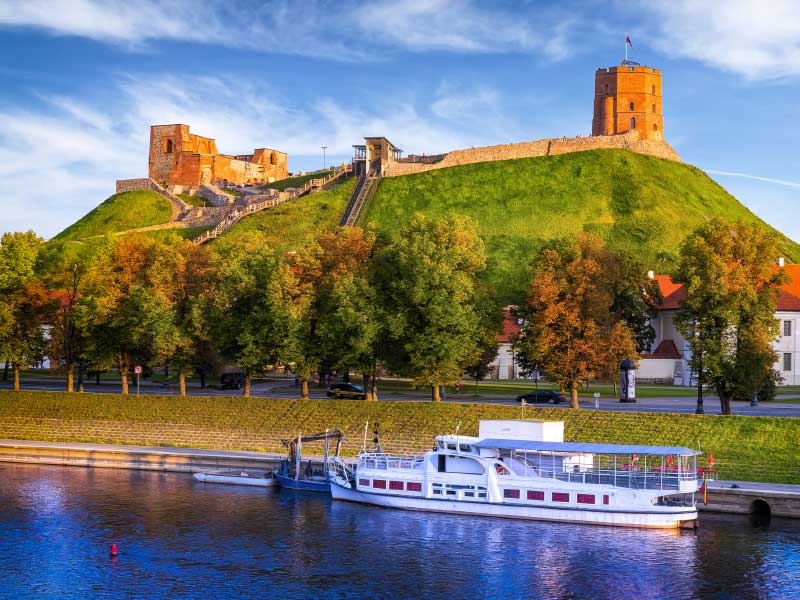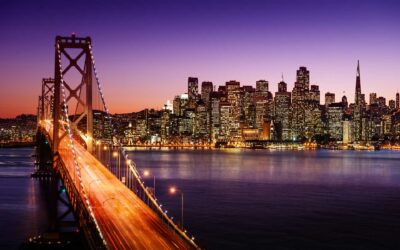Vilnius: A Business Traveller's Guide
your complete introduction to the second most-populous city in the Baltic statesTravelling to Vilnius?
Are you planning on travelling to Vilnius for work? Get to know the capital of Lithuania better in this comprehensive guide for business travellers.
Nestled in the heart of Eastern Europe, Vilnius is a place which exists between eras. Baroque-style buildings line cobbled streets in the UNESCO-listed Old Town, while medieval churches still stand tall beneath gleaming skyscrapers, the glass offering a reflection of the city’s journey from a Grand Duchy to a modern European capital.
Once referred to as the Rome of the North for its reputation as a stronghold of Catholic values and its architectural beauty, the city is fast becoming a central business hub and a cradle for fledgling startups. Throw in competitive tax rates and a government actively supporting foreign investment, and you’ll see why Vilnius is the worst-kept secret for businesses of all sizes.
In this comprehensive guide to Vilnius for business travellers, we delve deeper into navigating the city’s unique corporate landscape, offer our top tips for getting around, and pick out our top 3 things to see or do to make your trip unforgettable.
Vilnius Fact File

The Vilnius coat of arms featuring the Latin phrase “Unitas – Justitia – Spes”, meaning “Unity – Justice – Hope”.
Languages
The official language in Vilnius is Lithuanian. English is not widely spoken, but is often used in business situations.
Currency
Euro (€)
Avg. Temperatures
Spring (Mar-May) = 6.7°C (44.0°F)
Summer (Jun-Aug) = 17.7°C (63.9°F)
Autumn (Sep-Nov) = 6°C (42.8°F)
Winter (Dec-Feb) = -1.7°C (28.9°F).
Getting To Vilnius
By Air
Vilnius International Airport (VNO), conveniently located just six kilometres from the city centre, serves as the main gateway to Lithuania by air. The airport offers a variety of international connections, making it easy to find flights from major European hubs. It is currently undergoing a major expansion project with a new departure terminal expected to open in early 2025.
By Road
Lithuania boasts a well-maintained network of highways, making getting to Vilnius by car a breeze. Depending on your origin, you can access the city via major European routes like the E28 (Via Baltica) that runs north-south, or the E85 that connects north-eastern Europe. Remember, Lithuania drives on the right side of the road.
By Train
Vilnius Railway Station serves as the main hub for trains from neighbouring countries and a convenient stop-off on broader European trips. Most routes are operated by Lietuvos Geležinkeliai (Lithuanian Railways), but PKP Intercity (Polish State Railways) also offer regular routes from major Polish cities like Warsaw and Krakow.
Business Culture & Etiquette
Don’t let the period architecture and cobbled streets fool you – Vilnius is as slick and modern a city as the European powerhouses which dominate the business pages of the national newspapers.
The main business district of Vilnius is Šnipiškės, located on the northern bank of the Neris River. It’s also known as the Vilnius Central Business District (Vilniaus CBD).
Lithuanians tend to spend time getting to know someone before diving into specifics, so expect meetings to begin with introductions and small talk designed to ensure everyone is properly acquainted. Once trust has been established, business is usually conducted via direct and clear communications that get to the meat and bones of a topic.
Note that Lithuanians prefer to discuss business with representatives of equal status – it is generally a good idea to provide hosts with a list of who you will be bringing to the table (along with a short biographical summary) so that the right level of seniority is present on both sides.
Here are a few other top business tips:
- If business progresses well, you might be invited to a pirtys, otherwise known as a sauna. Saunas are a popular leisure activity for Lithuanians and are valued as places to relax and socialise.
- Understanding some basic Lithuanian phrases goes a long way. A simple “aciu” (thank you), “labas rytas” (good morning), or “prasad” (you’re welcome/please) can show your respect for the local culture and create a positive impression.
Crime & Safety
Crime in Vilnius has been steadily declining over the past decade and is among one of the safest cities in Europe, according to the Vilnius County Police Commissariat. According to a survey of locals, the safest districts (known as locally as “wards”) are Rasos, Verkii and Žvērynas, with the old town also rated extremely safe.
However, while violent crime is low, visitors should be wary of pickpockets, particularly in high-traffic or tourist areas. Consider storing any cash and valuable documents such as your passport in a money belt or crossbody bag when out and about, and avoid unlit streets at night.
It is also important to note that while Vilnius, as a metropolitan centre, is generally accepting of LGBTQ+ travellers, smaller towns and rural areas can be less so. Though same-sex relationships are legal, same-sex marriages and civil partnerships are not recognised under Lithuanian law. As such, the current advice from the UK Government is to remain vigilant while travelling within Lithuanian if you are part of the LGBTQ+ community.
Here are a few of our other top safety tips:
- In Lithuania, the emergency number for police, fire, and ambulance services is 112. Alongside Lithuanian, operators are usually able to speak English, Russian, and Polish.
- If you need to take a taxi anywhere, look for one with a yellow roof light displaying the company name and license number. Legitimate taxis should also have company logos on the doors.
Getting Around Vilnius
Trolleybuses
Trolleybuses are essential buses that receive their power from overhead wires, much like trams. The trolleybus network in Vilnius is extensive and reaches most districts within the city. Single paper tickets can be purchased from the driver for €1 (as of July 2024) or you can purchase a digital ticket using the Trafi app which also provides real-time schedules.
Ridesharing
Bolt is the dominant ridesharing service in Vilnius. Prices can vary depending on factors like distance, time of day, and car category (standard, comfort, XL, Tesla) but fares are generally competitive when compared to taxis. Uber is also available as a ridesharing option. However, Uber’s service in Vilnius is less extensive and you might struggle to find an available car.
Bike Sharing
Vilnius does have a bike-sharing scheme called Cyclocity. However, it is important to note that this scheme only operates between early April and late October. During these operational months, Cyclocity offers a network of docking stations across Vilnius, with bikes purchased via the JCDecaux Lietuva app or by using the Cyclocity card at select locations.
Top 3 Things To See Or Do In Vilnius
If you find yourself with a bit of free time on your business trip, Vilnius is a city with a rich history and offers plenty to see and do. Here are our top 3 recommendations…

1. Vilnius Old Town
Founded in 1387 by Lithuanian Grand Duke and King of Poland Jogalia in 1387, Vilnius’ Old Town, is one of the largest surviving medieval towns in Northern Europe – 70 streets and nearly 1500 buildings affording it the status of a metropolis in its own right.
Marvel at architectural gems such as the Gothic St. Anne’s Church and the baroque Vilnius Cathedral or get lost in the maze of cobblestone. If you fancy stopping for something to eat or drink, take a stroll down Pilies Street, the main hub of Old Town activity and the home to dozens of cozy cafes and eateries.

2. Gediminas’ Tower
Climb the iconic Gediminas’ Tower, a symbol of Vilnius and the remnants of a once-grand castle. Standing atop Gediminas Hill, the tower offers panoramic views across the city’s red-tiled rooftops and winding Neris River.
The tower is an important part of Lithuania’s national history – it was depicted on the country’s former currency (the litas) and is often referenced in national folk songs. If you want to learn more about the history of Gediminas’, a museum is housed within the tower walls. Exhibits include archaeological finds from the hill as well as model reconstructions of the tower and its castle during its golden era.

3. Uzupis
Self-styled as the “Republic of Uzupis”, this quirky neighbourhood within the city is known for its artistic spirit and bohemian charm. Streets are lined with colourful murals and sculptures of all shapes and sizes, while independent art galleries within the district often host art shows and exhibitions.
The character of Uzupis is neatly defined by the “Constitution of Uzupis”. This tongue-in-cheek document is engraved in English, French, Lithuanian and several other languages on plaques running along Paupio street, and outlines the rights of its citizens – including the right to be happy.
In Conclusion
Vilnius is a dynamic city that blends medieval history with a thriving modern business scene.
On the surface, the Lithuanian capital isn’t your typical business destination – it rarely enters into conversations that rank the best places to buy and sell on the continent. However, its strategic location in the heart of Eastern Europe and its growing reputation as a place where new and upcoming enterprises can thrive means that its popularity is growing day by day.
Yet while its allure as a business travel destination steadily increases, the city’s enduring appeal lies in the unique history and character it weaves. Cobblestone streets lined with Gothic architecture stand alongside sleek office buildings, and business meetings are carried out with a professionalism elevated by typical Lithuanian warmth.
Beyond the boardrooms is a wealth of cultural delights. Climb Gediminas’ Tower to marvel in breathtaking cityscapes, wander the charming streets of the Old Town, or lose yourself in the quirky artistic haven of Uzupis.
So, whether you’re a seasoned business traveller seeking a unique destination or a visitor with a curious spirit, Vilnius is a place that rarely disappoints.
Related Articles
A Day In The Life of a Senior Sales Manager
With a sales career that started in finance and blossomed in business travel, Phil Gardner is an experienced industry veteran with plenty of stories to tell. In this article, we chat with Phil about his day-to-day responsibilities as a Senior Sales Manager at Gray Dawes, his ultimate career highlights, and a random appearance on a British TV dating show…
San Francisco: A Business Traveller’s Guide
Are you planning on travelling to San Francisco for work? In this comprehensive guide to San Francisco for business travellers, we delve into navigating the city’s unique corporate landscape, offer our top tips for getting around, and pick out our top 3 things to see or do to make your trip unforgettable.
The Power of Equality, Diversity & Inclusion in Business Travel
Is EDI the Cornerstone of Success in Business Travel?At Gray Dawes, we believe that an inclusive workforce in which everyone feels valued is not only a vital cog in the running of a thriving organisation but a good blueprint for providing our clients with better...
LET’S TALK
Fill in the form below and we’ll get back to you as soon as we can.


